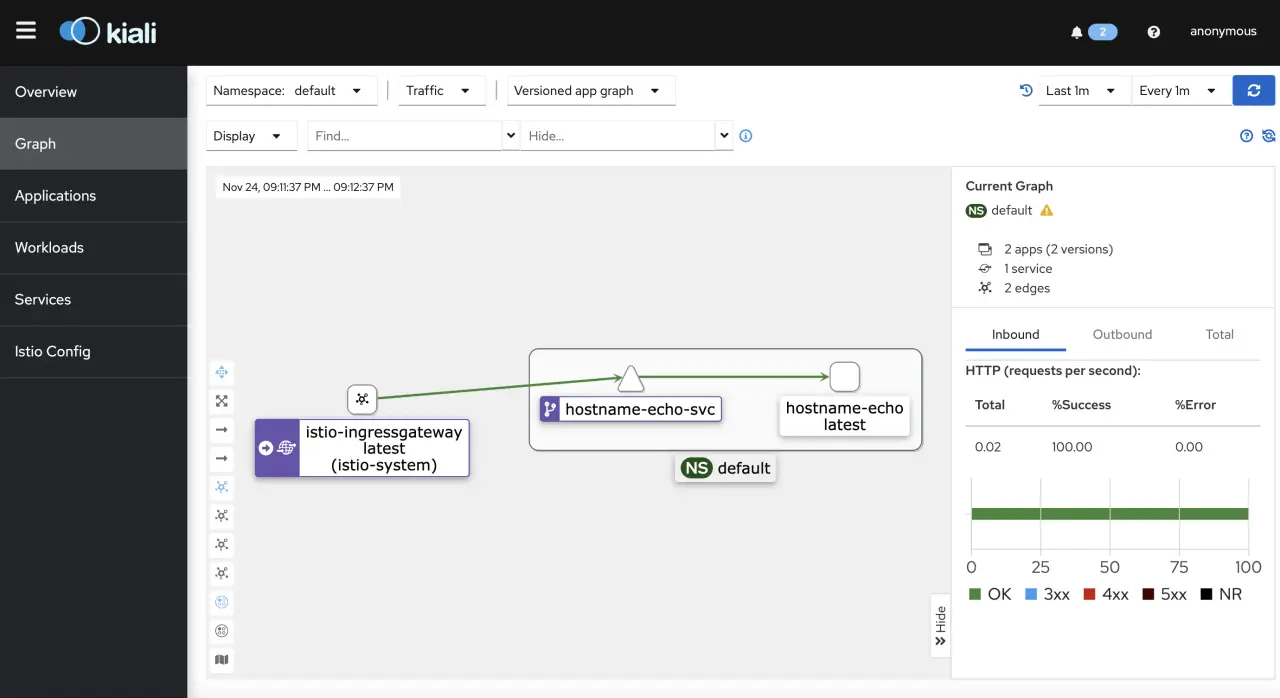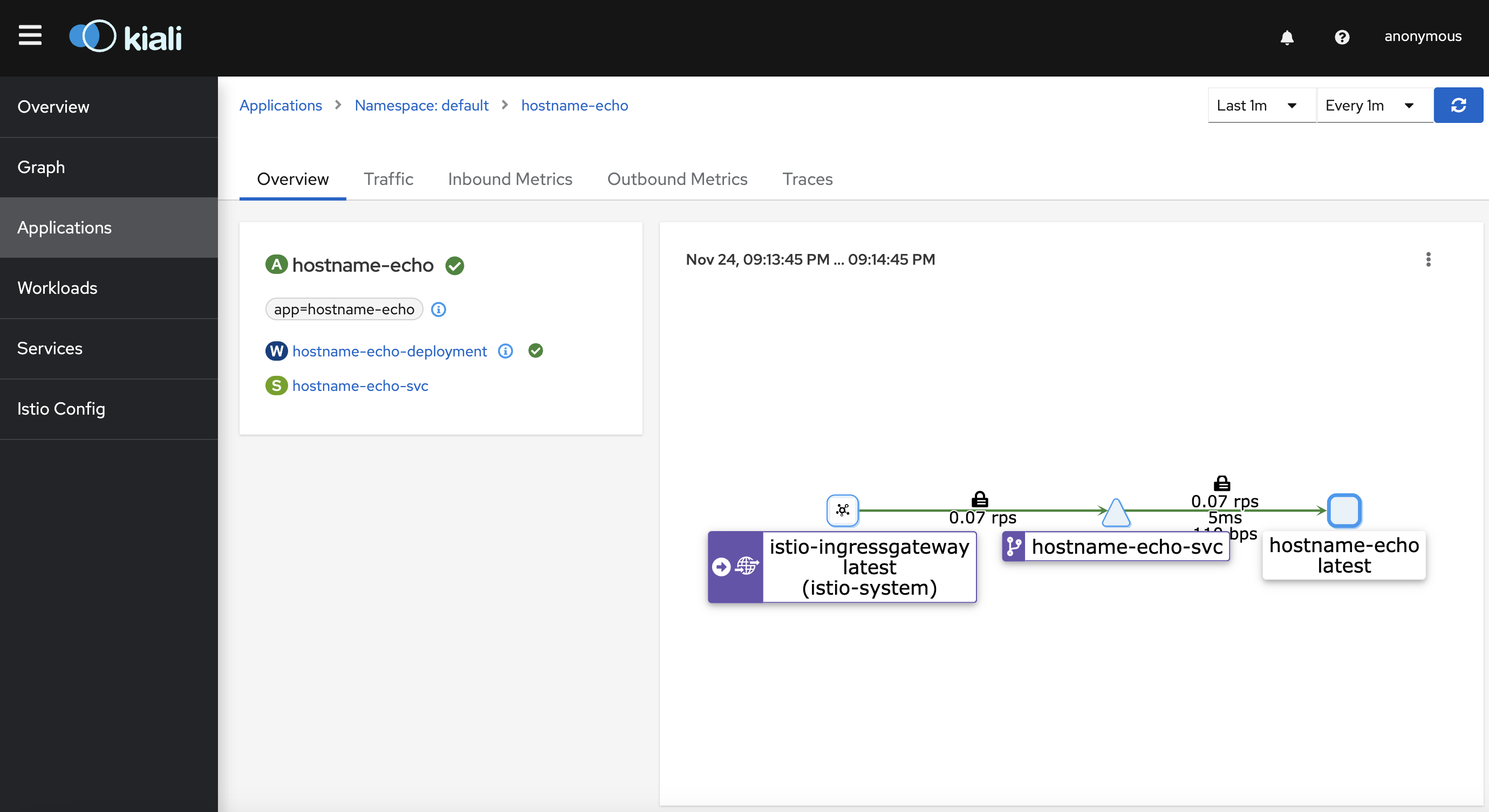Install Istio and Octavia Load Balancer on Kubernetes

We are going to use Istio as a service mesh for our Kubernetes Cluster and Octavia Load Balancer as ingress gateway for mesh.
Prequiresitions:
- Kubernetes Cluster deployed with Ansible (article)
- OpenStack Cloud Controller Manager
- OpenStack Octavia Enabled
1. Istio
Istio is a service mesh tool that provides observability, security in depth and traffic management.
Traffic Management
We can direct traffic within our mesh. Traffic management is based on Envoy proxies that are deployed along with services.
API Resource:
- Virtual Service -> route requests to a service in different ways
- Gateway -> manage inbound and outbound traffic for your mesh (ingress/egress traffic)
- Destination Rules -> are applied after virtual service as destionation rules such as traffic policy(load balancing mode), tls security mode, circuit breaker and so on
- Service entry -> redirect and forward traffic, apply retry, timeout for external destinations
Security
Istio security features provide strong identity, powerful policy, TLS encryption and authntication, authorization and audit(AAA) tools to protect your services and data.
Observability
Istio provides us the following types of telemetry:
- Metrics -> latency, traffic, errors and saturation
- Distributed Traces -> distributed trace spans for each service
- Access Logs -> full record of each request
2. Octavia Load Balancer
Octavia is an open source, operator-scale load balancing solution designed to work with OpenStack.
Setup Octavia Load Balancer with Ansible
1
$ vi inventory/$CLUSTER/group_vars/all/openstack.yml
1
2
3
4
5
6
7
8
9
10
11
12
13
14
15
16
17
18
19
20
21
22
23
24
25
26
27
28
29
30
31
## Override default LBaaS behavior
openstack_lbaas_use_octavia: True
openstack_lbaas_method: "ROUND_ROBIN"
openstack_lbaas_provider: "amphora" # or `octavia` depends on your provider configuration
openstack_lbaas_create_monitor: "yes"
openstack_lbaas_monitor_delay: "1m"
openstack_lbaas_monitor_timeout: "30s"
openstack_lbaas_monitor_max_retries: "3"
## Values for the external OpenStack Cloud Controller
external_openstack_lbaas_network_id: "<network_id>" # your internal cluster network
external_openstack_lbaas_subnet_id: "<subnet_id>" # a subnet from your internal cluster network
external_openstack_lbaas_floating_network_id: "<floating_network_id>" # it's usually the same as `public` network
external_openstack_lbaas_floating_subnet_id: "<floating_subnet_id>" # subnet from
external_openstack_lbaas_method: "ROUND_ROBIN"
external_openstack_lbaas_provider: "amphora"
external_openstack_lbaas_create_monitor: false
external_openstack_lbaas_monitor_delay: "1m"
external_openstack_lbaas_monitor_timeout: "30s"
external_openstack_lbaas_monitor_max_retries: "3"
external_openstack_lbaas_manage_security_groups: false
external_openstack_lbaas_internal_lb: false
external_openstack_network_ipv6_disabled: false
external_openstack_network_internal_networks:
- "<internal_cluster_network_name>"
external_openstack_application_credential_name: <credential_name>
external_openstack_application_credential_id: <credential_id>
external_openstack_application_credential_secret: <credential_secret>
## The tag of the external OpenStack Cloud Controller image
external_openstack_cloud_controller_image_tag: "v1.23.3"
Run
1
$ ansible-playbook --become -i inventory/$CLUSTER/hosts cluster.yml
Check if OpenStack cloud controller manager is working
1
$ kubectl -n kube-system get pods | grep "openstack"
1
2
NAME READY STATUS RESTARTS AGE
openstack-cloud-controller-manager-k6945 1/1 Running 0 5m
3. Install Istio
Instructions for installing Istio control plane on Kubernetes can be found here
Get Istio
1
$ curl -L https://istio.io/downloadIstio | sh -
Move to Istio directory
1
$ cd <istio-directory>
Install Istio client
1
2
3
$ brew install istioctl
# or (istioctl client binary in the bin/ directory)
$ export PATH=$PWD/bin:$PATH
Install Istio
We use demo configuration profile. There are 6 profiles: default, demo, minimal, remote, empty and preview. (Installation Configuration Profiles)
1
$ istioctl install --set profile=demo -y
1
2
3
4
5
6
✔ Istio core installed
✔ Istiod installed
✔ Egress gateways installed
✔ Ingress gateways installed
✔ Installation complete
Making this installation the default for injection and validation.
Inject Envoy sidecar proxies into default namespace:
1
$ kubectl label namespace default istio-injection=enabled
Deploy test application
1
$ kubectl apply -f deployment.yaml
deployment.yaml
1
2
3
4
5
6
7
8
9
10
11
12
13
14
15
16
17
18
19
20
21
22
23
24
25
26
27
28
29
30
31
32
33
34
apiVersion: apps/v1
kind: Deployment
metadata:
name: hostname-echo-deployment
spec:
replicas: 1
selector:
matchLabels:
app: hostname-echo
template:
metadata:
labels:
app: hostname-echo
spec:
containers:
- image: "lingxiankong/alpine-test"
imagePullPolicy: Always
name: hostname-echo-container
ports:
- containerPort: 8080
---
apiVersion: v1
kind: ClusterIP
metadata:
name: hostname-echo-svc
spec:
ports:
- port: 8080
protocol: TCP
targetPort: 8080
selector:
app: hostname-echo
type: LoadBalancer
The test application is deployed but we can not access it from outside. To make it accessible, we need to create an Istio Ingress Gateway
Deploy Gateway and Virtual Service
1
$ kubectl apply -f gateway.yaml
gateway.yaml
1
2
3
4
5
6
7
8
9
10
11
12
13
14
15
16
17
18
19
20
21
22
23
24
25
26
27
28
29
30
31
32
33
apiVersion: networking.istio.io/v1alpha3
kind: Gateway
metadata:
name: hostname-echo-gateway
spec:
selector:
istio: ingressgateway
servers:
- port:
number: 80
name: http
protocol: HTTP
hosts:
- "*"
---
apiVersion: networking.istio.io/v1alpha3
kind: VirtualService
metadata:
name: hostname-echo
spec:
hosts:
- "*"
gateways:
- hostname-echo-gateway
http:
- match:
- uri:
exact: /
route:
- destination:
host: hostname-echo-svc
port:
number: 8080
Ensure that there are no issues with the configuration:
1
2
3
$ istioctl analyze
✔ No validation issues found when analyzing namespace: default.
Get Istio Ingress IP
1
$ kubectl get svc istio-ingressgateway -n istio-system
Run the following command to retrieve the gateway ip
1
2
```bash
$ export GATEWAY_IP=$(kubectl -n istio-system get service istio-ingressgateway -o jsonpath='{.status.loadBalancer.ingress[0].ip}')
Verify external access
Test connectivity
1
$ echo http://$GATEWAY_IP
1
hostname-echo-deployment-7d5d9dfcc8-n9sc4
View dashboard
Kiali Dashboard is an observability console for Istio with service mesh configuration and validation capabilities
1
2
$ kubectl apply -f samples/addons
$ kubectl rollout status deployment/kiali -n istio-system
Access the Kiali dashboard
1
$ istioctl dashboard kiali
